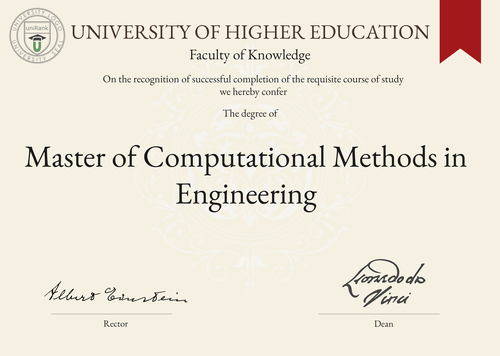
Master of Computational Methods in Engineering (M.C.M.E.)
Guide to Master of Computational Methods in Engineering Program/Course/Degree
Master of Computational Methods in Engineering (M.C.M.E.)

Program Name:
Master of Computational Methods in EngineeringProgram or Degree abbreviation:
M.C.M.E.Duration range:
The duration of the program typically ranges from 1 to 2 years.Tuition range:
The tuition fees for the program vary depending on the chosen country and university, ranging from $10,000 to $30,000 per year.Overview:
The Master of Computational Methods in Engineering program is designed to provide students with advanced knowledge and skills in applying computational methods to solve engineering problems. It combines theoretical foundations with practical applications, equipping graduates with the ability to analyze complex engineering systems and develop innovative solutions.Curriculum Overview by year:
- Year 1: Introduction to Computational Methods, Advanced Mathematics for Engineers, Engineering Modeling and Simulation, Numerical Methods for Engineering Analysis. - Year 2: Advanced Topics in Computational Engineering, Optimization Techniques, Computational Fluid Dynamics, Finite Element Analysis.Key Components:
- Computational Methods: Students will learn various computational techniques and algorithms used in engineering analysis and simulation. - Engineering Modeling: The program emphasizes the development of mathematical models to represent real-world engineering systems. - Numerical Analysis: Students will gain proficiency in numerical methods for solving engineering problems. - Optimization: The program covers optimization techniques to improve engineering designs and processes. - Simulation: Students will learn to use simulation software to analyze and predict the behavior of engineering systems.Career Prospects:
Graduates of the Master of Computational Methods in Engineering program can pursue careers in various industries, including aerospace, automotive, energy and manufacturing. They can work as computational engineers, research analysts, simulation specialists, or consultants, contributing to the development and improvement of engineering processes and systems.Salary Expectations:
The salary expectations for graduates of this program can vary depending on factors such as the country, industry and level of experience. On average, computational engineers earn a salary ranging from $70,000 to $100,000 per year. For a more accurate understanding of salary expectations, you can utilize the Job Sites Search Engine, from our sister site jobRank, which searches over 4,600 job sites worldwide. Make sure to specify not only the job title but also the country you are interested in.Conclusions:
It is important to note that the duration, tuition fees, curriculum, key components, career prospects and salary expectations of the Master of Computational Methods in Engineering program can vary depending on the chosen country or location for studying the program, as well as the chosen university. Prospective students are advised to research and compare different options to find the program that best suits their needs and goals. Visitors can search for where this specific degree, M.C.M.E., is offered anywhere in the world through the uniRank World Universities Search Engine.World Universities Search Engine
search for Master of Computational Methods in Engineering (M.C.M.E.) and add the Location (country, state etc.) or specific University you are interested in studying at.
Query examples:
- Master of Computational Methods in Engineering (M.C.M.E.) United States
- Master of Computational Methods in Engineering (M.C.M.E.) United Kingdom online
- Master of Computational Methods in Engineering (M.C.M.E.) Australia international students
- Master of Computational Methods in Engineering (M.C.M.E.) University of California
- Master of Computational Methods in Engineering (M.C.M.E.) University of London tuition fees
- Master of Computational Methods in Engineering (M.C.M.E.) University of Sydney scholarships
Share Program/Course
Interesting? Share this program/course/degree info with your friends now.